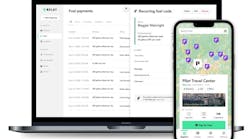Drumroll, please. It’s finally here, a regulation that we have been waiting for—and waiting for what feels like an eternity. Is the logjam lifting? Are regulations that we as an industry and MAP-21, as a Surface Transportation Bill, have insisted on being developed ultimately moving? It finally appears so, since the drug and alcohol clearinghouse appeared in the Federal Register as a proposed rulemaking seeking comments from the trucking industry on how to proceed forward with what could inevitably make our roads safer.
Obviously, we know the ins and outs of a clearinghouse and the benefits that it would bestow on a trucking industry that has long advocated a zero tolerance policy, but what really matters when it comes to proposed rulemakings is the ability of an industry to comment on the rule. By commenting, I am referring to stating your opinion on a rule that may indeed provide the Federal Motor Carrier Safety Administration (FMCSA) with ample information on how a rule will affect the industry and how best to proceed forward with that rule.
Commenting on a proposed rule is something that many motor carriers should take quite seriously, and I am not just talking about the drug and alcohol clearinghouse either. I am talking about all major rules that will have an impact on how we deliver freight. Submitting comments to federal agencies (FMCSA is not the only one) provides an opportunity for stakeholders to help shape a rule and provide practical insight to proposed regulations. The most recent hours-of-service regulation had over 25,000 comments submitted on it, which obviously is one of the largest. Even smaller ones, however, require input from the industry as well, since you and your drivers represent the front lines of highway travel.
Many carriers I know have expressed that they are not real sure on how to comment or what to include, and some may lack the confidence that what they provide to the agency in writing will be read. If it helps, the agency must read everything that is submitted regarding a specific rule, even if it is written on a cocktail napkin. My point is, commenting on a rule should not be viewed as an overbearing task, but rather as a chance to get your voice heard.
When commenting, be specific and include examples of how a rule may affect your operation. In many instances, the agency will want information, so they will ask questions in their proposals. Just answer the questions, but be concise. The agency receives lots of comments, so it’s important that you make your point quickly without rambling on.
Comments are now easier to submit than ever before. Filing them online via regulations.gov is simple, easy and timely. Don’t forget to note the docket number when filing. It’s important to file your comment prior to the deadline, since it may not be considered if you file it afterwards.
In a nutshell, don’t miss out on an opportunity to voice your concerns in writing regarding a particular rule. You may even be able to shed some light on an issue that was not ever considered before, not to mention that we as an industry are stronger when everyone speaks.
David Heller, CDS, is director of safety and policy for the Truckload Carriers Assn. He is responsible for interpreting and communicating industry-related regulations and legislation to the membership of TCA. Send comments to [email protected].


